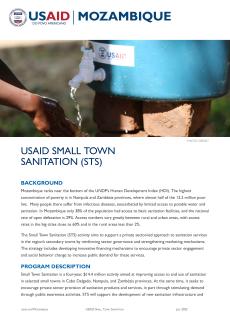BACKGROUND
Mozambique ranks near the bottom of the UNDP’s Human Development Index (HDI). The highest concentration of poverty is in Nampula and Zambézia provinces, where almost half of the 12.2 million poor live. Many people there suffer from infectious diseases, exacerbated by limited access to potable water and sanitation. In Mozambique only 38% of the population had access to basic sanitation facilities, and the national rate of open defecation is 29%. Access numbers vary greatly between rural and urban areas, with access rates in the big cities close to 60% and in the rural areas less than 2%.
The Small Town Sanitation (STS) activity aims to support a private sector-led approach to sanitation services in the region’s secondary towns by reinforcing sector governance and strengthening marketing mechanisms. The strategy includes developing innovative financing mechanisms to encourage private sector engagement and social behavior change to increase public demand for these services.
PROGRAM DESCRIPTION
Small Town Sanitation is a four-year, $14.4 million activity aimed at improving access to and use of sanitation in selected small towns in Cabo Delgado, Nampula, and Zambézia provinces. At the same time, it seeks to encourage private sector provision of sanitation products and services, in part through stimulating demand through public awareness activities. STS will support the development of new sanitation infrastructure and sustainable management approaches within selected small towns. STS will align with the Government of Mozambique’s Water Policy (2016), the Action Plan for the Implementation of the Sustainable Development Goals (SDGs) in the Water Supply and Sanitation Sector 2015-2030, and USAID/Mozambique’s 2020 WASH Country Plan to contribute to the overall goal of improving the well-being of communities, especially among women and girls. It will also develop financing mechanisms for both consumers and sanitation businesses, supporting the development of improved household toilet models and improved public latrines. Public outreach programs will seek to increase use of sanitation facilities and improved hygiene practices, notably adoption of latrine construction, safe disposal of child feces, handwashing with soap, and menstrual hygiene management.
EXPECTED RESULTS AND IMPACTS
Small Town Sanitation expects to show impacts in three areas:
strengthened local market capacity to provide sanitation products and services for households,
increased management capacity for public sanitation services, and
increased household investment in sanitation products and improved hygiene behaviors.
STS expects to increase women’s leadership within the sector, and enhance their decision-making power within the household for water, sanitation, and hygiene.

